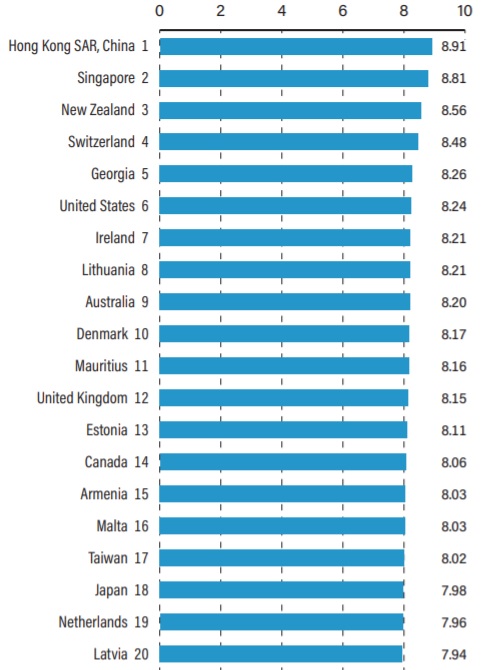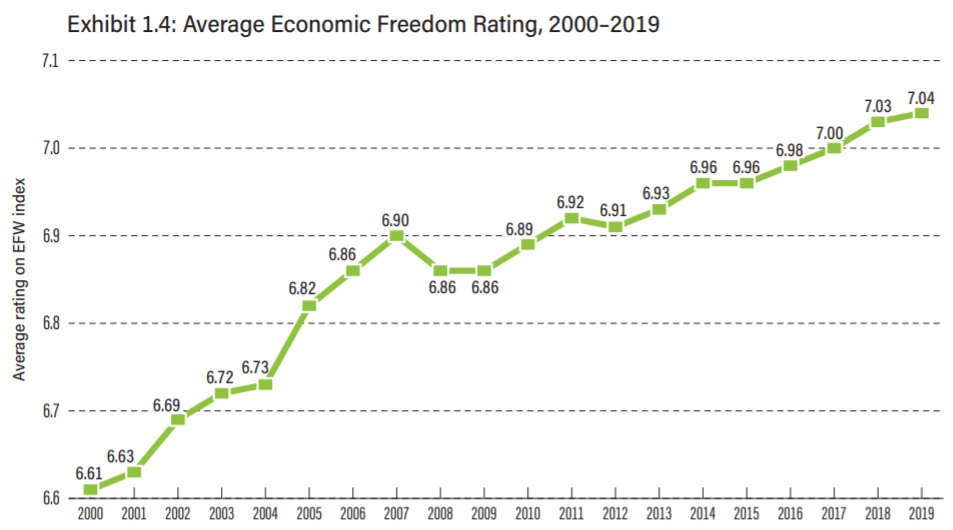The Fraser Institute in Canada has released its latest edition of Economic Freedom of the World, an index that measure and ranks nations based on whether they follow pro-growth policy.
Based on the latest available data on key indicators such as taxes, spending, regulation, trade policy, rule of law, and monetary policy, here are the top-20 nations.
You may be wondering how Hong Kong is still ranked #1.
In this summary of the findings, the authors explain that EFW is based on 2019 data. In other words, before Beijing cracked down. This means Hong Kong will probably not be the most-free jurisdiction when future editions are released.
The most recent comprehensive data available are from 2019. Hong Kong remains in the top position. The apparent increased insecurity of property rights and the weakening of the rule of law
caused by the interventions of the Chinese government during 2020 and 2021 will likely have a negative impact on Hong Kong’s score, especially in Area 2, Legal System and Property Rights, going forward. Singapore, once again, comes in second. The next highest scoring nations are New Zealand, Switzerland, Georgia, United States, Ireland, Lithuania, Australia, and Denmark.
The United States was #6 in last year’s edition and it remains at #6 this year.
There are some other notable changes. The country of Georgia jumped to #5 while Australia dropped to #9.
Perhaps the most discouraging development is that Chile dropped to #29, a very disappointing result (and perhaps a harbinger of further decline in the nation that used to be known as the Latin Tiger).
And it’s also bad news that Canada has deteriorated over the past five years, dropping from #6 to #14.
The good news is that the world, on average, is slowly but surely moving in the right direction. Not as rapidly as it did during the era of the “Washington Consensus,” but progress nonetheless.
By the way, the progress is almost entirely a consequence of better policy in developing nations, especially the countries that escaped the tyranny of Soviet communism.
Policy has drifted in the wrong direction, by contrast, in the United States and Western Europe.
Indeed, the United States currently would be ranked #3 if it still enjoyed the level of economic liberty that existed in 2000.
In other words, the Bush–Obama–Trump years have been somewhat disappointing.
Let’s look at another chart from the report. I’ve previously pointed out that there’s a strong relationship between economic freedom and national prosperity.
Well, here’s some additional evidence.
Let’s close by considering some of the nations represented by the red bar in the above chart.
You probably won’t be surprised to learn that Venezuela is once again ranked last. Though it is noteworthy that its score dropped from 3.31 to 2.83. I guess Maduro and the other socialists in Venezuela have a motto, “when you’re in a hole, keep digging.”
Argentina isn’t quite as bad as Venezuela, but I also think it’s remarkable that its score dropped from 5.88 to 5.50. That’s a big drop from a nation that already has a bad score.
Given these developments (as well as what’s happening in Chile), it’s not easy to be optimistic about Latin America.
P.S. There isn’t enough reliable data to rank Cuba and North Korea, so it’s quite likely that Venezuela doesn’t actually have the world’s most-oppressive economic policies.



[…] wonk with a keen interest in international and comparative economics, I write every year (2022, 2021, 2020, 2019, etc) about the annual release of Economic Freedom of the World, published by the […]
[…] stated, people enjoy much higher levels of income in nations where there’s more free enterprise and less […]
[…] stated, people enjoy much higher levels of income in nations where there’s more free enterprise and less […]
[…] performance around 1980 is the result of a big increase in economic liberty (as measured by Economic Freedom of the World) that also was occurring around that […]
[…] I wrote about the 2021 edition of Economic Freedom of the World, I noted that both Chile and Canada were drifting […]
[…] routinely ranks very high in international comparisons of economic liberty, so that means that there are many good […]
[…] routinely ranks very high in international comparisons of economic liberty, so that means that there are many good […]
[…] especially powerful if you care about what’s best for the disadvantaged. As the chart from Economic Freedom of the World illustrates, poor people enjoy much higher levels of income in nations that have higher levels of […]
[…] the start of this interview, I cite Economic Freedom of the World and the Index of Economic Freedom to make the point that more economic liberty is correlated with […]
[…] to the latest edition of Economic Freedom of the World, Estonia ranks #13 (out of 165 […]
[…] see overall rankings of economic liberty, you can peruse the data from Economic Freedom of the World and the Index of Economic […]
[…] see overall rankings of economic liberty, you can peruse the data from Economic Freedom of the World and the Index of Economic […]
[…] close by noting that Bulgaria is ranked #36 in the latest edition of Economic Freedom of the World, which is a good but not great […]
[…] to the most recent edition, France ranks #53, which is a very poor grade for a developed […]
[…] to the most recent edition, France ranks #53, which is a very poor grade for a developed […]
[…] if you peruse the latest edition of Economic Freedom of the World, you’ll see that Sri Lanka has very low scores, far below […]
[…] I discuss rule of law (generally when explaining the various components that are used to calculate rankings of economic freedom), I often use a shortcut definition – namely that rule of law exists when government officials […]
[…] start with Russia’s scores from the latest edition of Economic Freedom of the […]
[…] let’s look at some updated data from the latest edition of Economic Freedom of the […]
[…] all,Russia ranks a lowly #100 in the most recent edition of Economic Freedom of the World. and does even worse (#113) in the most recent edition of the […]
[…] The only good news for Europeans (if we’re grading on a curve) is that there’s been a decline in both the relative and absolute levels of economic freedom in the United States during the 21st century. […]
[…] performance around 1980 is the result of a big increase in economic liberty (as measured by Economic Freedom of the World) that also was occurring around that […]
[…] The Fraser Institute’s Economic Freedom of the World shows a similar decline for the United […]
[…] crunched the data from Economic Freedom of the World, I think Sven is […]
[…] rule of law (generally when explaining the various components that are used to calculate rankings of economic freedom), I often use a shortcut definition – namely that rule of law exists when government officials […]
[…] on his discussion of India’s partial economic liberalization. We’ll start by perusing the most-recent edition of Economic Freedom of the World to confirm that there was a significant increase in economic […]
[…] a chart from the latest edition of Economic Freedom of the World. As you can see, economic freedom has increased over the past two […]
[…] I discuss rule of law (generally when explaining the various components that are used to calculate rankings of economic freedom), I often use a shortcut definition – namely that rule of law exists when government officials […]
[…] I discuss rule of law (generally when explaining the various components that are used to calculate rankings of economic freedom), I often use a shortcut definition – namely that rule of law exists when government […]
[…] of the Human Freedom Index has been released. When you combine measures of personal freedom and economic freedom, the “sensible nation” of Switzerland is at the top of the […]
[…] was already declining because of the soft leftism of two recent presidents, Michelle Bachelet and Sebastián Piñera, and […]
[…] And that narrative is confirmed by looking at Chile’s score from the Fraser Institute’s Economic Freedom of the World. […]
[…] I’m not surprised. There has not been any meaningful pro-growth reform this century. Indeed, the opposite is true. Policy has actually drifted in the wrong direction. […]
[…] instead use foreign aid as a reward for good policy (as measured by getting higher scores in the Economic Freedom of the World […]
[…] a piece for Canada’s Fraser Institute (publishers of Economic Freedom of the World and Economic Freedom of North America), Robert and I updated our numbers and explained the […]
[…] why some nations enjoy much stronger economic growth than other nations, the best place to start is the Fraser Institute’s Economic Freedom of the […]
[…] you want to understand why some nations enjoy much stronger economic growth than other nations, the best place to start is the Fraser Institute’s Economic Freedom of the […]
[…] performance around 1980 is the result of a big increase in economic liberty (as measured by Economic Freedom of the World) that also was occurring around that […]
[…] performance around 1980 is the result of a big increase in economic liberty (as measured by Economic Freedom of the World) that also was occurring around that […]
[…] All this is depicted in the “socialism slide,” which I created back in 2019 to show how nations score in the Fraser Institute’s Economic Freedom of the World. […]
[…] All this is depicted in the “socialism slide,” which I created back in 2019 to show how nations score in the Fraser Institute’s Economic Freedom of the World. […]
[…] All this is depicted in the “socialism slide,” which I created back in 2019 to show how nations score in the Fraser Institute’s Economic Freedom of the World. […]
[…] of communist mismanagement). But the biggest increase was enjoyed by Lithuania, which also is very highly ranked for economic liberty. Not a […]
[…] that’s not very likely when the United States is ranked #6 and China is ranked #116 for economic […]
[…] last week about the new edition of Economic Freedom of the World, I largely focused on the jurisdictions that […]
Honestly, Daniel. I’m getting tired of repeating the same comment. You have it wrong about New Zealand! I live here. I know. I try to run a business. The Marxists in Office have set the path for Venezuela. See my previous comments for clarification.